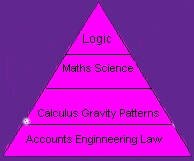The God Almighty Argument against Evidentialism
Often, in my attempt to seek God, I’d eventually find myself down to this
situation; a tussle between the element of “strong rationalism’ within me
against the everlasting light of the almighty omnipotent God. The former
demands strong reasons for evidence before sincere acceptance. The latter is
the invisible presence that accompanies me wherever I go since the day I was
born. This strange, inexplicable presence likens to what C.S Lewis mentioned in
his essay – *the moral argument – of a mind that is not like anything else we
know; a mind that presses the good, the reasonable, the fair into every one of
our actions and desires. In other words, I’m always left with reconciling the
God almighty argument with evidentialism.
The God almighty argument is simple. Yet, the irony of it is that most of us
tend to overlook it either deliberately or unconsciously. The definition of a
God should and must be universally the same. And it doesn’t matter if you’re
human or alien, or from Africa or Jupiter. The idea of a God must rule over
all, not just earth but down from where we are, across the Milky Way to the
ends of the universe.
God is almighty.
This says more than what our fleeting mind usually takes us. This means that
if God wants to, he can drive his fist unto us from above when we tell that
little lie. God, in his wrath, can destroy the devils and serpents right from
the one that tempted Adam and Eve to the one that made the Rolling Stones
famous. More importantly, in the context of the God almighty argument, God’s
intelligence is beyond us. God’s knowledge and wisdom, transcends all
humans even that of Solomon’s who had prayed for wisdom and gotten it.
Therefore, to acknowledge the presence of God would be to mean, under the
same breath, that we’re totally incapable of understanding God’s
laws of nature and the universe. That we are in no position to look beyond
our capabilities to search for an answer. That pitting human rationalism against
God’s work will be blasphemous.
Having understood or conceded the definition of God, evidentialism would be
hard pressed for convincing. Evidentialism demands for evidence based on
rationalism before appropriate belief. And clearly, that evidence is limited by
human intelligence. And if what we attempt to figure out were beyond what we
have to try, the attempts would obviously fail. More importantly, using reasons
to determine one’s beliefs would be to place reasons above God, thereby
contradicting the initial definition of God we have in the first place.


Everything that men have learnt and put together from the beginning of time from engineering to business has been based on the logic system. Everything today makes sense otherwise it wouldn’t last the stress of time in our “logic” world. This however, is not the same for God. God’s “world” has an added dimension that includes the illogical truths. These are elements of truths that do not make sense to us but are in fact, true. Like what Thomas Aquinas says in his paper – **The harmony of Reason and Revelation – there is a twofold mode of truth. One that God has revealed to us and one that he has chosen not to. Paul also mentioned in I Cor 13:12 “Now I know in part; then I shall know fully.” Here, whether what has not been revealed to us is logical is quite another issue. Nonetheless, I believe that the unrevealed falls into both the logical and the illogical. Therefore, the unforgiving atheist should not be too quick to dismiss the issue once things do not make sense to him.
Ergo, any assertion that postulates an almighty – omnipotent – entity, God that is, will not allow room for further debate. And so it seems. Suppose when reason and sensibility of the argument crumbles and we assume that God’s power is within the mental capacities of mere mortals, what will become of God? If we can figure God out like neighbours or colleagues, like maths and gravity, God will cease to be God. God will be just like one of us. The idea of a God therefore loses its meaning right from the very beginning. The consequences of that supposition will be even scarier. God will be available only to the wise, intelligent and few. The definition of an all-loving God for all people without prejudice will also diminish together with salvation.
We never understood how Santa knew what we wanted didn’t we? We were sure we
had them securely locked up in our minds.
If this argument seems to ring true for the hopeful theist; unfortunately, it is not sufficient. It ostensibly takes more than an argument to win the stubborn soul over. It takes more than a fist from heaven. It takes more than for the red sea to part. For me, there is still the concept of faith to grapple with. Can I say I believe?
* The Moral Argument by C.S Lewis. An essay in Philosophy of Religion by Michael Perterson, William Hasker, Bruce Reichenbach, David Basinger. Oxford University Press 2001
**The harmony of Reason and Revelation by Thomas Aquinas. Philosophy of Religion by Michael Perterson, William Hasker, Bruce Reichenbach, David Basinger. Oxford University Press 2001